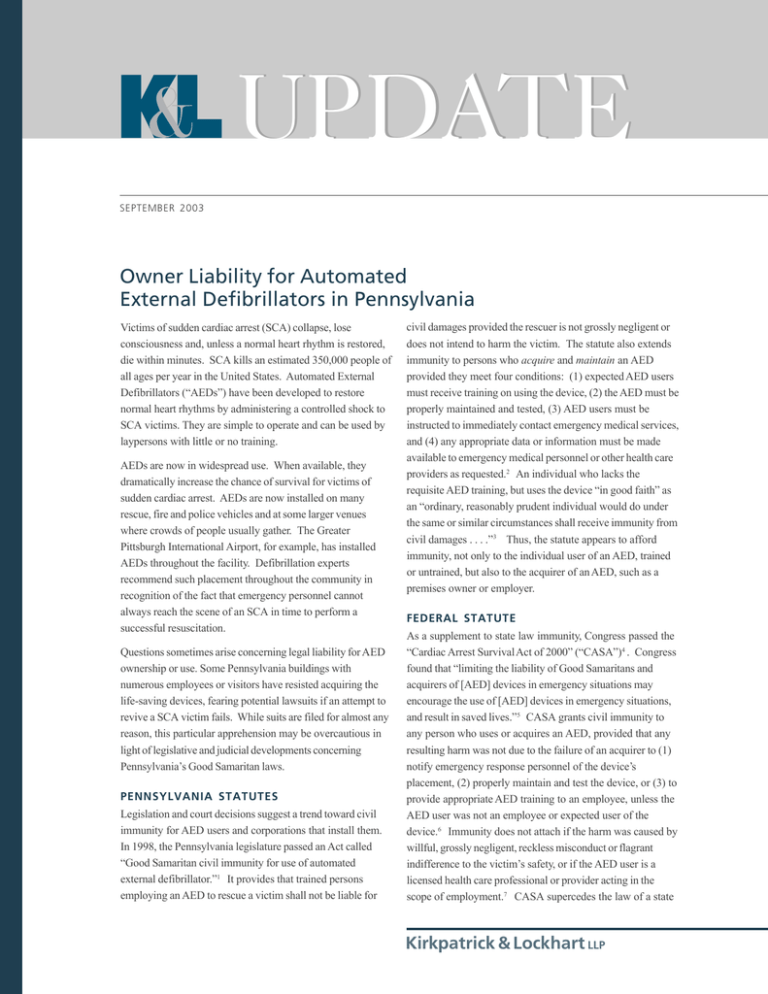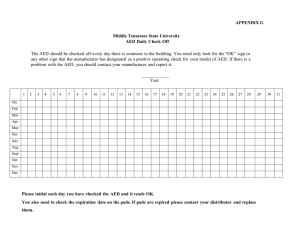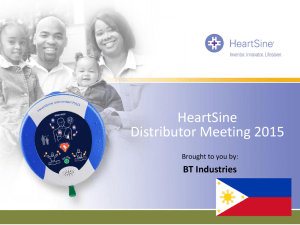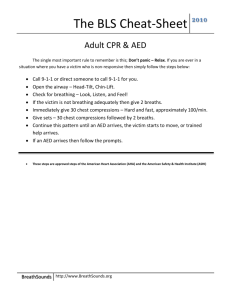UPDATE Owner Liability for Automated External Defibrillators in Pennsylvania
advertisement

UPDATE SEPTEMBER 2003 Owner Liability for Automated External Defibrillators in Pennsylvania Victims of sudden cardiac arrest (SCA) collapse, lose consciousness and, unless a normal heart rhythm is restored, die within minutes. SCA kills an estimated 350,000 people of all ages per year in the United States. Automated External Defibrillators (“AEDs”) have been developed to restore normal heart rhythms by administering a controlled shock to SCA victims. They are simple to operate and can be used by laypersons with little or no training. AEDs are now in widespread use. When available, they dramatically increase the chance of survival for victims of sudden cardiac arrest. AEDs are now installed on many rescue, fire and police vehicles and at some larger venues where crowds of people usually gather. The Greater Pittsburgh International Airport, for example, has installed AEDs throughout the facility. Defibrillation experts recommend such placement throughout the community in recognition of the fact that emergency personnel cannot always reach the scene of an SCA in time to perform a successful resuscitation. Questions sometimes arise concerning legal liability for AED ownership or use. Some Pennsylvania buildings with numerous employees or visitors have resisted acquiring the life-saving devices, fearing potential lawsuits if an attempt to revive a SCA victim fails. While suits are filed for almost any reason, this particular apprehension may be overcautious in light of legislative and judicial developments concerning Pennsylvania’s Good Samaritan laws. PENNSYLVANIA STATUTES Legislation and court decisions suggest a trend toward civil immunity for AED users and corporations that install them. In 1998, the Pennsylvania legislature passed an Act called “Good Samaritan civil immunity for use of automated external defibrillator.”1 It provides that trained persons employing an AED to rescue a victim shall not be liable for civil damages provided the rescuer is not grossly negligent or does not intend to harm the victim. The statute also extends immunity to persons who acquire and maintain an AED provided they meet four conditions: (1) expected AED users must receive training on using the device, (2) the AED must be properly maintained and tested, (3) AED users must be instructed to immediately contact emergency medical services, and (4) any appropriate data or information must be made available to emergency medical personnel or other health care providers as requested.2 An individual who lacks the requisite AED training, but uses the device “in good faith” as an “ordinary, reasonably prudent individual would do under the same or similar circumstances shall receive immunity from civil damages . . . .”3 Thus, the statute appears to afford immunity, not only to the individual user of an AED, trained or untrained, but also to the acquirer of an AED, such as a premises owner or employer. FEDERAL STATUTE As a supplement to state law immunity, Congress passed the “Cardiac Arrest Survival Act of 2000” (“CASA”)4 . Congress found that “limiting the liability of Good Samaritans and acquirers of [AED] devices in emergency situations may encourage the use of [AED] devices in emergency situations, and result in saved lives.”5 CASA grants civil immunity to any person who uses or acquires an AED, provided that any resulting harm was not due to the failure of an acquirer to (1) notify emergency response personnel of the device’s placement, (2) properly maintain and test the device, or (3) to provide appropriate AED training to an employee, unless the AED user was not an employee or expected user of the device.6 Immunity does not attach if the harm was caused by willful, grossly negligent, reckless misconduct or flagrant indifference to the victim’s safety, or if the AED user is a licensed health care professional or provider acting in the scope of employment.7 CASA supercedes the law of a state Kirkpatrick & Lockhart LLP only to the extent that the state has no statute or regulations that provide a particular class of persons with immunity from civil damages.8 In any case, the combination of Federal and State law seems to afford broad immunity to users and owners of AEDs in Pennsylvania. PRACTICAL CONSIDERATONS The AED owner’s level of comfort may be enhanced when the legal environment is considered in the context of the nature of cardiac arrest and the self-limiting control system of the AED. It is unlikely that a SCA victim will recover without defibrillation within a ten-minute window. As each minute passes, the chances of successful resuscitation diminish. It is thus difficult to contemplate how use of an AED can worsen the patient’s condition or prospects. The possibility of causing harm is further diminished by the AED itself. The current models are difficult to misuse and simple to operate. The devices are programmed to diagnose ventricular fibrillation and will only permit a shock to be administered if the victim requires it. Although the patient may fail to revive, it is unlikely that a situation would be worsened by the availability and use of the device. Taken together, the Pennsylvania Good Samaritan statutes, Congressional action and the practical aspects of AED usage provide comfort for an owner considering installing AEDs in appropriate locations. The legal system appears to be doing what it can to facilitate the availability of these lifesaving devices. or federal immunity statutes. As AEDs become more widely available and gain greater public acceptance, it is possible that the courts will adopt a different view of an owner’s duty. CONCLUSION A well-executed AED program should not attract undue liability. AEDs should be placed in an accessible location and plainly identified. The devices should be maintained according to the manufacturer’s specifications. Key employees should be identified and trained. If these precautions are observed, a building owner should not increase its overall liability risk by installing AEDs. H. WOODRUFF TURNER wturner@kl.com 412.355.6478 1 See 42 PA. CONS. STAT. ANN. § 8331.2 (West 2002). The statute appears to extend the protections of the Nonmedical Good Samaritans Civil Immunity Act of 1976, 42 Pa. Cons. Stat. Ann. § 8332 (West 2002) by including language tending to negate a court ruling that limited civil immunity for corporations. See Kleinknecht v. Gettysburg College, 989 F.2d 1360, 1374-1375 (3rd Cir. 1993) (applying the 1976 Pennsylvania statute, college not immune from liability for student athlete’s death because corporation could not have completed a course in rendering care.) 2 See 42 PA. CONS. STAT. ANN. § 8331.2(b) (West 2002). 3 42 PA. CONS. STAT. ANN. § 8331.2(e) (West 2002). POTENTIAL LIABILITY FOR FAILURE TO INSTALL AEDS 4 See 42 U.S.C.A. §§ 201-238q (West 2002). In addition to considering liability for deploying an AED, a premises owner must consider the possibility of suit by the survivors of an unresuscitated SCA victim if an AED is not available in a place where the need might reasonably have been foreseen. That landowners have some level of duty to provide medical aid to invitees is made clear in Restatement (Second) of Torts, § 314A. Claims that AEDs should have been available were raised in Somes v. United Airlines, Inc., 33 F. Supp. 2d 78 (D.Mass, 1999) and Talit v. Northwest Airlines, Inc., 58 Conn. App. 102, 752 A.2d 1131 (2000). However, a divided Pennsylvania Supreme Court recently held that a tennis club did not owe a duty to a victim to have an AED available for emergency use.9 The underlying events in that case occurred in 1996, prior to the widespread deployment of AEDs and before enactment of either the state 5 42 U.S.C.A. § 238p(10) (West 2002). 6 42 U.S.C.A. § 238q(a) (West 2002). 7 42 U.S.C.A. § 238q(b) (West 2002). 8 42 U.S.C.A. § 238q(c) (West 2002). 9 Atcovitz v. Gulph Mills Tennis Club, 812 A.2d 1218 (Pa. 2002). The Court recognized that the AED Good Samaritan Statute creates “an exception for imposing liability on an untrained individual who uses an AED in a limited emergency situation.” 812 A.2d at 1224. ® Kirkpatrick & Lockhart LLP Challenge us. ® www.kl.com BOSTON ■ DALLAS ■ HARRISBURG ■ LOS ANGELES ■ MIAMI ■ NEWARK ■ NEW YORK ■ PITTSBURGH ■ SAN FRANCISCO ■ WASHINGTON ......................................................................................................................................................... This publication/newsletter is for informational purposes and does not contain or convey legal advice. The information herein should not be used or relied upon in regard to any particular facts or circumstances without first consulting a lawyer. © 2003 KIRKPATRICK & LOCKHART LLP. ALL RIGHTS RESERVED.




